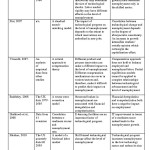Redesigning Cities Could Solve Our Biggest Problems. But We’re Hardly Talking About Them.
Cities are the biggest thing we create. But when we talk about sustainability, there is still surprisingly little discussion about how our cities are designed as a whole.
This is a clip from 2012: Time For Change (2010). Watch the full film for free online here or via Hulu. You can buy the DVD here.
For more info on eco-cities, we highly recommend checking out Richard Register’s website: http://www.ecocitybuilders.org/
Jordan Heller ~ One Of America’s Poorest Cities Has A Radical Plan To Remake Itself
 CLEVELAND ― The last time Tymika Thomas’ name appeared in newsprint was in connection with an elaborate 2012 robbery in the Cleveland suburb of Wickliffe in which Thomas and two accomplices stole numerous handguns and more than $30,000 in cash from a bookie.
CLEVELAND ― The last time Tymika Thomas’ name appeared in newsprint was in connection with an elaborate 2012 robbery in the Cleveland suburb of Wickliffe in which Thomas and two accomplices stole numerous handguns and more than $30,000 in cash from a bookie.
Thomas, who knew the victim and was well aware that he kept a large amount of money in his home, took the man out for a night on the town while her partners broke into his house. Thomas and the man returned to find two armed robbers wearing ski masks. They absconded with the man’s possessions and took Thomas as a hostage. The kidnapping was bogus, of course, meant to disabuse the victim of any suspicion that Thomas was involved.
“The judge called me the mastermind,” says Thomas, now 42, dressed in a blue smock and a hair net that covers her thick blonde braids, before explaining her motive for the crime that earned her four years and nine months in prison — a sentence she completed last year. “We were all kind of in a rut, I had six kids and just lost my job, and we were just looking to get financially stable.”
We are in the Evergreen Cooperative Laundry, located in Cleveland’s Collinwood neighborhood on the east side of the city, a community that has long suffered from disinvestment. Despite her felony conviction (“Getting a job was my biggest fear,” she says, “having to check that felony box”), Thomas is now a supervisor at the laundry, where she runs a crew that prepares packs of surgical linen for the Cleveland Clinic, the world-renowned hospital nearby.
Read more: https://www.huffingtonpost.com/cleveland-ohio-poorest-cities
Rebecca Dalzell ~ A City To Grow Into
“It sounds utopian, I know,” says Daniel Haime, standing over the map of Serena del Mar, the city he is building on the Caribbean Sea. He plans to transform a 2,500-acre site outside Cartagena, Colombia – which his family bought in 1968 – into a lively metropolis. There will be a world-class hospital, low-income housing and state-run schools, a marina and bike trails, a luxury hotel and waterfront dining. One day, vaporetti on the lagoon could connect Serena del Mar to downtown Cartagena.
It seems like an auspicious time to build a new city in Colombia. In 2016, the government and theFARC rebel group signed a peace deal ending 50 years of conflict. A cautious optimism buoys the economy. Bogotá and Medellín, the country’s largest cities, have become models for smart urban design. But not Cartagena. It may be one of the fastest-growing cities in Colombia but, according to Nicolás Galarza Sanchez, a research scholar at New York University’s Marron Institute of Urban Management, it is also a case study in how not to expand. It has spread in a fashion typical of South America: high-rise condominiums for the rich have sprouted along the waterfront while poor settlements made up of squalid, informal dwellings have grown in areas prone to flooding. Galarza and his colleagues are working with the Colombian government to help manage growth in 100 cities across the country.
Read more: https://www.1843magazine.com/a-city-to-grow-into
Anna Kučírková ~ Millions Face The Life-Threatening Dangers Of Poor Sanitation
 In our ever changing and evolving world, improvements in living conditions are essential. Sanitation is our first line of defense against communicable diseases and epidemics of infectious diseases such as influenza, typhoid, cholera, and more.
In our ever changing and evolving world, improvements in living conditions are essential. Sanitation is our first line of defense against communicable diseases and epidemics of infectious diseases such as influenza, typhoid, cholera, and more.
And while developed nations tend to have outstanding methods of sanitation and good hygiene practices, developing nations still lose millions of lives every year because of poor or non-existent sanitation systems, according to the World Bank (2017).
But knowing generally about the problem doesn’t really help you understand just how bad the situation really is. In order to move toward change, a clear-eyed view of the problem is essential.
Here’s what you really need to know.
The Stark Lack of Basic Sanitation Around The World
Modern sanitation facilities are vital to public health. And while access to sanitary facilities has increased dramatically in the past twenty years, nearly 2.3 billion people still don’t have toilets or access to upgraded latrines.
Thankfully, the General Assembly of UN declared access to safe drinking water and modern sanitation as a human right in 2010. International efforts to help provide safe and accessible drinking water and sanitation are underway.
But, in spite of the progress, the 2015 target to cut the proportion of the population without access to improved sanitation facilities in half missed by nearly 700 million people.
There are still hundreds of thousands of people dying each year from diseases directly related to their lack of access to clean water and proper sanitation.
The one element that perpetuates a vicious cycle of disease and poverty is open defecation.
In places where open defecation is widespread, the number of deaths of children under 5 years old are as high as the levels of malnutrition and poverty.
Access to clean water is one of the keys to defeating the deaths of millions around the globe.
Read more: https://connectforwater.org/the-life-threatening-dangers-of-poor-sanitation/
Susan Parnell ~ Urban Planet
Urban Planet, a new open-access edited volume on sustainable urban development, is launched. The book is a collaborative project within Future Earth and emphasises the need for a new knowledge generation agenda, given the urgency of understanding the sustainability challenges and options for a rapidly urbanising planet.
The urban future is a critical determinant of the viability and vitality of the human endeavour towards a global sustainable future. This centrality of cities to the sustainability of people, planet, and prosperity points to the need for continuous investments in an expanded and flexible urban science and practical knowledge generation that is forged out of innovative interdisciplinary and multi-sectoral understandings of the complex systems that both drive and derive from the prevalence of urban ways of being. Greater understanding of urbanisation processes and the multi-scale interactions and feedbacks with the earth system is required for addressing the complex issues related to urbanization and sustainability, and for aiding in the solutions.
The book aims, therefore, not only to provide a synthesis of existing knowledge across the different disciplines, but also to showcase new ways of producing and integrating knowledge, extending the frontier of urban research, and providing new directions in research and practice that will help us achieve the cities we want now and in the future.
ACC’s Susan Parnell is co-editor of the volume believes the book will be a great resource for ecologists and urbanists, practitioners and policy-maker alike.
Read more (incl. Download the ebook free of charge) – https://www.africancentreforcities.net/urban-planet/
Maeve McClenaghan ~ A Hundred Homeless People Have Died Since October But No-One Is Asking Why
It has been almost two years since Cardon Banfield’s partially-mummified body was found in a tent, just metres from a public footpath in Worcester.
The homeless 74 year-old, who settled in the UK from the Caribbean in 1961, part of the Windrush generation, was so badly decomposed that the coroner was only able to identify him through DNA testing.
In the intervening years, campaigners and local charities have pushed for an official review into how an elderly man came to such an ignominious end. But despite public pressure, the local Safeguarding Adults Board – the body tasked with exploring possible social care failures – refused to do an official review.
This week Worcester City council published an informal review into Banfield’s death. Now, those that called for the review say it fails to fully address the issues and are calling again for an official review.
The Bureau of Investigative Journalism can reveal that homeless deaths are hardly ever reviewed in England and Wales, with, on average, just one official review a year being logged since 2010.
With no official count of deaths and very few reviews being commissioned, experts are concerned that officials simply do not know how and when homeless people are dying.
In this climate, the Bureau has launched Dying Homeless, a project to record deaths on UK streets.
Read more: https://www.thebureauinvestigates.com/hundred-homeless-people-have-died



